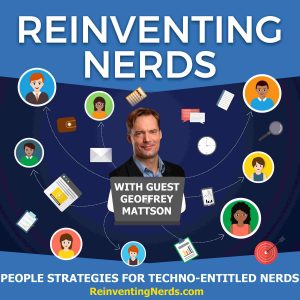![]()
Joanie interviews Etienne de Bruin, CEO of 7CTOs, a company that offers forums of peer groups of CTOs who follow a curriculum to pursue and inspire innovative thinking. Etienne shares the typical people challenges CTO’s run into, as well as his own. He also asks Joanie about hers!
Highlights:
Q: What kinds of challenges do CTOs run into?
“When you start going into a leadership role, especially CTO land, your problem starts to shift to a people problem.”
Q: How did you pivot when you moved into the role of a CTO?
“I had a few moments when I realized I was missing the plot.”
“A transformation for me was when I personally went from seeing my employees on my team as extensions of me. I had to flip that and see them as creative beings that had their own ways of how they wanted to do things.”
“I always thought I was creating a collaborative environment, but I wasn’t. At one point, I almost had a mutiny on my hands.”
Q: What kinds of things come up in your CTO forums?
“When you strike this beautiful balance between mutual trust and vulnerability, then you see tech geniuses open up at levels that are really amazing.”
“Being able to have your friends that you connect with is rare. To get to that level where you can really share and have people give you actionable advice or help takes really hard work. It’s an investment.”
Q: How does technology factor in to your forum format?
“In-person meetings are crucial to us because we think that the nuances, the unspoken gestures, all those things contribute to the larger conversation. It does impact the way people share, to have a physical manifestation that your voice has an equal place at the table.”
Words of Wisdom:
“Letting them fail. That’s tough.”
“With the control factor, oftentimes there’s something else going on.”
Contact Etienne:
Email: Etienne@7ctos.com
Websites: 7ctos.com, Everydev.com
Twitter & Instagram: @etdebruin
Podcast: Play in new window | Download
